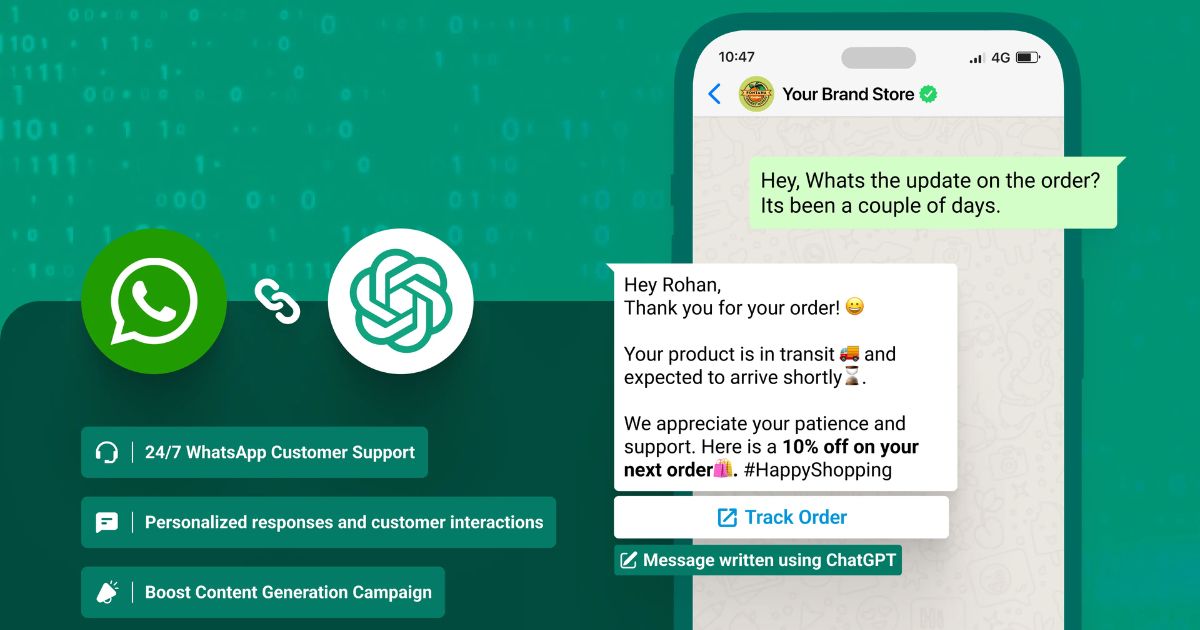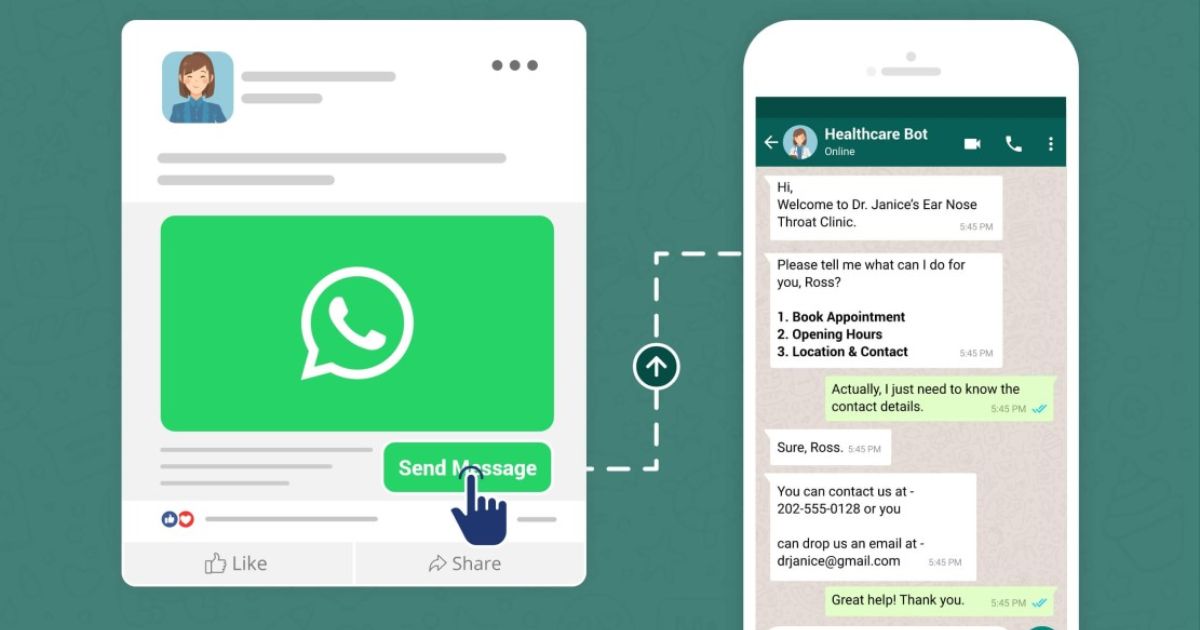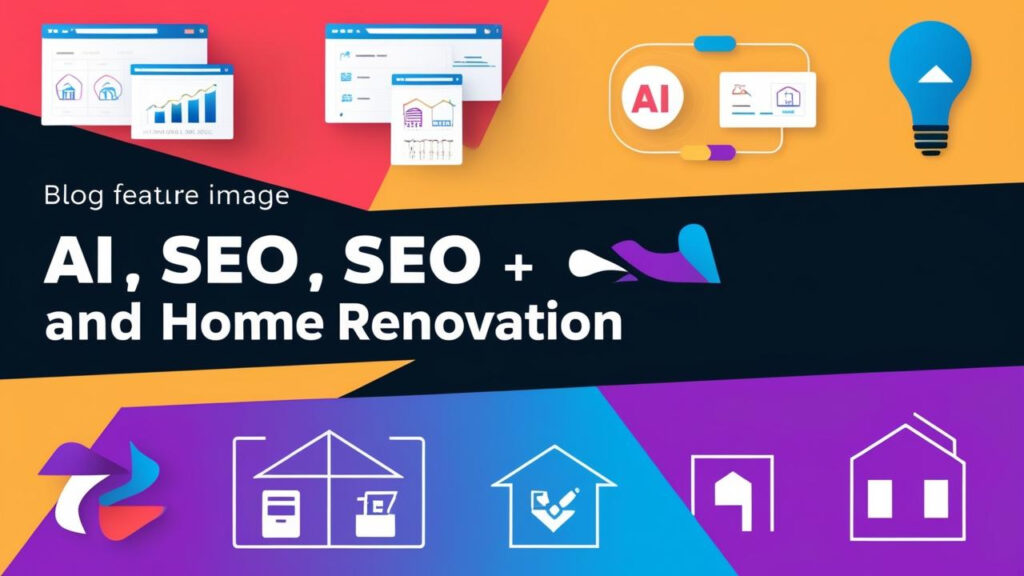Are you tired of manually responding to every single message that comes through your WhatsApp account? Do you wish there was a way to automate some of those responses? Well, now there is. With AI WhatsApp automation, you can streamline your messaging process and save time.

AI WhatsApp automation uses artificial intelligence technology to analyze incoming messages and respond with pre-set messages based on keywords and phrases. This means you can set up automated responses for common questions or requests, freeing up your time to focus on other tasks. Plus, with the ability to customize your responses, you can ensure that the messaging remains personalized and relevant to your audience.
Overview of AI in Messaging
As messaging apps continue to dominate the digital communication landscape, businesses are turning to AI-powered automation to keep up with the demand for instant responses. AI in messaging can help companies automate various aspects of their customer service and sales processes, streamlining operations and providing a better customer experience.
Evolution of Chatbots
The use of chatbots in messaging apps has been around for a while, but the technology has come a long way in recent years. Early chatbots were often clunky and frustrating to use, but advances in natural language processing (NLP) and machine learning have made them much more effective.
Today's chatbots can understand and respond to complex customer queries in a way that feels natural and human-like. They can even learn from past interactions to improve their responses over time.
AI vs. Traditional Automation
AI-powered messaging automation goes beyond simple rule-based automation, which can only respond to a limited set of pre-defined queries. With AI, messaging automation can be more flexible and responsive, adapting to customer needs in real-time.
AI-powered messaging automation can also provide more personalized experiences for customers by using data to tailor responses and recommendations. This can help businesses build stronger relationships with customers and increase sales.
In conclusion, AI-powered messaging automation is a powerful tool for businesses looking to improve their customer service and sales processes. With advances in AI technology, chatbots and messaging automation are becoming more effective and sophisticated, providing a better experience for customers and streamlining operations for businesses.
Setting Up AI WhatsApp Automation
When it comes to setting up AI WhatsApp automation, there are a few key considerations to keep in mind. By following the steps below, you can ensure that your automation is effective, efficient, and compliant with all relevant regulations.
Choosing the Right AI Platform
The first step in setting up AI WhatsApp automation is to choose the right platform. There are many different AI platforms available, each with its own strengths and weaknesses. Some of the key factors to consider when choosing a platform include the type of AI technology used, the level of customization available, and the ease of integration with other systems.
Integration with WhatsApp API
Once you have chosen an AI platform, the next step is to integrate it with the WhatsApp API. This will allow you to send and receive messages automatically, without any manual intervention. To do this, you will need to follow the instructions provided by WhatsApp, which typically involve setting up a webhook and configuring your AI platform to send and receive messages through it.
Compliance and Privacy Considerations
Finally, it is important to consider compliance and privacy when setting up AI WhatsApp automation. Depending on your location and the nature of your business, there may be specific regulations that you need to comply with, such as GDPR or CCPA. Additionally, you will need to ensure that any personal data collected through your automation is handled in a secure and responsible manner.
By taking these factors into account, you can set up AI WhatsApp automation that is effective, efficient, and compliant with all relevant regulations.
Building the AI Model

To build an AI model for WhatsApp automation, there are several steps that need to be followed. In this section, we will discuss the three main steps involved in building an AI model: Training Data Collection, Natural Language Processing, and Machine Learning Algorithms.
Training Data Collection
The first step in building an AI model is to collect training data. This data will be used to train the model to recognize patterns and make predictions. The training data should be diverse and representative of the types of messages that the model will be processing.
To collect training data, you can use a tool like WhatsApp Web to export chat logs. These logs can then be cleaned and formatted to create a dataset that can be used to train the model. It's important to ensure that the dataset is balanced and contains enough examples of each message type.
Natural Language Processing
Once you have collected the training data, the next step is to process it using natural language processing (NLP) techniques. NLP is a subfield of AI that focuses on the interaction between computers and humans using natural language.
NLP techniques can be used to extract features from the text, such as keywords and entities. This information can then be used to train the model to recognize patterns and make predictions.
Machine Learning Algorithms
The final step in building an AI model is to select and train machine learning algorithms. Machine learning algorithms are used to train the model to recognize patterns in the data and make predictions.
There are several machine learning algorithms that can be used for this task, including decision trees, random forests, and support vector machines. The choice of algorithm will depend on the specific requirements of the project.
In conclusion, building an AI model for WhatsApp automation involves collecting training data, processing it using NLP techniques, and training machine learning algorithms. By following these steps, you can create an AI model that can recognize patterns and make predictions based on the messages it receives.
User Experience Design

When it comes to AI WhatsApp automation, user experience design plays a critical role in ensuring that the chatbot delivers a seamless experience. A well-designed chatbot can help businesses to engage customers, increase customer satisfaction, and drive sales.
Conversational Interfaces
One of the key aspects of user experience design is the conversational interface. The chatbot should be designed to understand natural language and respond in a way that is easy to understand. This means that the chatbot should be able to handle different variations of the same question and provide relevant answers.
To achieve this, businesses can use machine learning algorithms to train the chatbot to understand natural language. This involves analyzing large amounts of data to identify patterns and create algorithms that can recognize different variations of the same question.
Personalization Strategies
Another important aspect of user experience design is personalization. A chatbot that is designed to provide personalized experiences can help to increase customer engagement and satisfaction.
To achieve this, businesses can use data such as customer preferences, purchase history, and browsing behavior to personalize the chatbot's responses. This can be done by creating rules-based algorithms that provide tailored responses based on specific customer data.
Overall, user experience design is critical to the success of AI WhatsApp automation. By creating a well-designed chatbot with a conversational interface and personalized responses, businesses can engage customers and drive sales.
Operational Aspects

Performance Monitoring
When implementing AI WhatsApp automation, it is crucial to monitor its performance to ensure that it is meeting the desired outcomes. You can use various tools to track the performance of your AI chatbot, such as Google Analytics, Mixpanel, and Amplitude. These tools can help you track metrics such as user engagement, retention rates, and conversion rates. By analyzing this data, you can identify areas for improvement and optimize your chatbot's performance.
Feedback Loops and Iteration
Feedback loops are an essential part of AI WhatsApp automation. They allow you to collect feedback from users and use that feedback to improve your chatbot's performance. You can use various methods to collect feedback, such as surveys, polls, and reviews. Once you have collected feedback, you can use it to make changes to your chatbot's design and functionality. Iteration is the process of making these changes and testing them to see if they improve the chatbot's performance. By continuously iterating and improving your chatbot, you can ensure that it meets the needs of your users and delivers the desired outcomes.
In summary, performance monitoring and feedback loops are crucial aspects of AI WhatsApp automation. By monitoring the chatbot's performance and collecting feedback from users, you can identify areas for improvement and optimize its functionality. By continuously iterating and improving your chatbot, you can ensure that it meets the needs of your users and delivers the desired outcomes.
Business Implications
Artificial intelligence (AI) powered WhatsApp automation is a game-changer in the business world. The use of AI in WhatsApp automation can lead to significant cost savings, improved customer engagement, and retention.
Cost Reduction and ROI
By automating WhatsApp communication, businesses can reduce the workload of their customer service personnel, which can lead to cost savings. AI-powered WhatsApp automation can handle a high volume of customer inquiries simultaneously, which can result in faster response times and improved customer satisfaction. This can lead to increased customer loyalty and retention.
Moreover, the use of AI in WhatsApp automation can lead to better decision-making. By analyzing customer data and feedback, businesses can gain valuable insights into their customers' needs and preferences. This information can be used to improve products and services, which can lead to increased revenue and ROI.
Customer Engagement and Retention
AI-powered WhatsApp automation can significantly improve customer engagement and retention. By using AI to personalize communication, businesses can create a more human-like experience for their customers. This can lead to increased customer loyalty and retention.
Moreover, AI-powered WhatsApp automation can help businesses better understand their customers' needs and preferences. By analyzing customer data and feedback, businesses can gain insights into what their customers want and tailor their offerings accordingly. This can lead to increased customer satisfaction and loyalty.
In conclusion, AI-powered WhatsApp automation can have a significant impact on businesses. By reducing costs, improving customer engagement, and retention, businesses can gain a competitive edge in the market.
Emerging Trends in AI Automation
Advancements in AI Technology
Artificial intelligence technology has been rapidly advancing in recent years, allowing for more sophisticated and complex automation processes. One major advancement is the use of natural language processing (NLP) to better understand and respond to customer inquiries. This technology allows for more human-like interactions, improving the overall customer experience.
Another important development is the integration of machine learning algorithms, which enable AI systems to learn and adapt based on customer interactions. This allows for a more personalized and efficient experience, as the AI system can better anticipate and respond to customer needs.
Future of Customer Service Automation
The future of customer service automation is bright, as AI technology continues to evolve and improve. One major trend is the use of chatbots and virtual assistants to handle routine customer inquiries and support requests. This frees up human agents to focus on more complex and high-value tasks, improving overall efficiency and productivity.
Another trend is the use of predictive analytics to anticipate customer needs and provide proactive support. By analyzing customer data and behavior, AI systems can identify potential issues before they arise and take action to prevent them.
Overall, the future of AI automation in customer service is promising, as companies continue to invest in this technology to improve the customer experience and drive business success.











